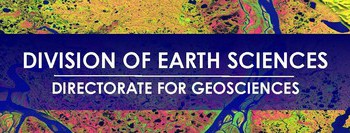The ABCs and 123s of the Division of Earth Sciences No Deadline Programs
September 13, 2017
The Division of Earth Sciences (EAR) supports research, education and infrastructure investments that advance scientific understanding of the Earth’s evolution, structure and the life it supports.
Eight Earth Sciences programs have eliminated all future target dates (in alphabetical order):
EarthScope supports research for broad, integrated studies across the Earth sciences. The EarthScope program will accept proposals until February 10, 2018, and then sunset. Solicitation: 17-577
Geobiology and Low-Temperature Geochemistry focuses on geochemical processes in terrestrial Earth’s surface environmental systems and the interaction of geochemical and biological processes. Solicitation: 15-559
Geomorphology and Land-Use Dynamics supports innovative research into processes that shape and modify landscapes over a variety of time scales. Solicitation: 15-560
Geophysics funds basic research in the physics of the solid earth to explore its composition, structure and processes from the Earth's surface to its deepest interior. Solicitation: 17-554
Hydrologic Sciences focuses on the fluxes of water in the environment that constitute the water cycle as well as the mass and energy transport function of the water cycle. Solicitation: 15-558
Instrumentation and Facilities supports meritorious requests for infrastructure that promotes research and education in research areas supported by the division. Solicitation: 16-609
Petrology and Geochemistry funds basic research on the formation of planet Earth, including its accretion, early differentiation and subsequent petrologic and geochemical modification via igneous and metamorphic processes. Solicitation: 17-547
Sedimentary Geology and Paleobiology supports the study of deep-time records of physical, biological and chemical processes archived in the Earth's sedimentary crust at all spatial and temporal scales. Solicitation: 17-536
Tectonics funds investigations aimed at understanding the deformation of the terrestrial continental lithosphere. Solicitation: 17-555
Elimination of target dates provides greater flexibility to our researchers by enabling them to submit proposals at their convenience. We encourage you to call your program director to discuss the optimal timing for submission. Additional information about the no deadline-programs are listed below:
- This decision broadens EAR's merit review pilot to additional programs. Four programs had already successfully implemented this change in the recent past.
- NSF will continue to assess the impact of this change to ensure it contributes to our goal of improving success rates in the division while reducing the burden on investigators, reviewers and submitting institutions.
- The division will continue to use a combination of ad hoc reviews and panel input to assess the intellectual merit and broader impacts of submitted proposals.
- Supplements, EAGERs and RAPIDs will continue to be entertained anytime following communication with the appropriate program director as indicated in the Proposal and Awards Policies and Procedures Guide (PAPPG).
- According to EAR policy, proposals that have been declined are not eligible for resubmission for one year from the original date of submission and must be substantially revised to be considered. Exceptions to this policy require prior approval by an EAR program director.
All Division of Earth Science programs are listed at https://www.nsf.gov/funding/programs.jsp?org=EAR.
Sign up for EAR updates by sending an email to listserv@listserv.nsf.gov. The text of the email must be in this format: subscribe [listname] [subscriber's name]. For example: subscribe EARTH Neysa Call.
The U.S. National Science Foundation propels the nation forward by advancing fundamental research in all fields of science and engineering. NSF supports research and people by providing facilities, instruments and funding to support their ingenuity and sustain the U.S. as a global leader in research and innovation. With a fiscal year 2023 budget of $9.5 billion, NSF funds reach all 50 states through grants to nearly 2,000 colleges, universities and institutions. Each year, NSF receives more than 40,000 competitive proposals and makes about 11,000 new awards. Those awards include support for cooperative research with industry, Arctic and Antarctic research and operations, and U.S. participation in international scientific efforts.
Connect with us online
NSF website: nsf.gov
NSF News: nsf.gov/news
For News Media: nsf.gov/news/newsroom
Statistics: nsf.gov/statistics/
Awards database: nsf.gov/awardsearch/
Follow us on social
Twitter: twitter.com/NSF
Facebook: facebook.com/US.NSF
Instagram: instagram.com/nsfgov



